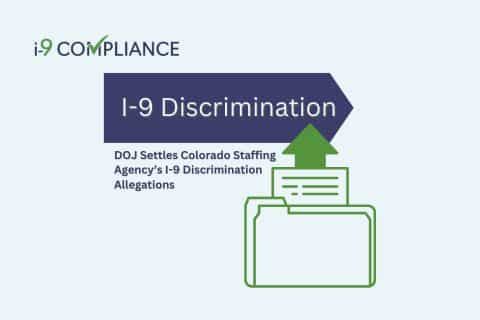DOJ Settles Colorado Staffing Agency’s I-9 Discrimination Allegations

July 4, 2023
The Department of Justice (DOJ) recently reached a new settlement agreement with a California-based staffing agency. This agreement addresses allegations of discrimination occurring during the employment eligibility verification (Form I-9) process. According to the DOJ, the employer discriminated against a worker by requesting more documentation than necessary. The employer required additional documents to verify his employment eligibility in the United States.
The DOJ began investigating after receiving a complaint from a non-U.S. citizen. Recently hired, he explained that the company’s personnel require him to present a foreign passport to verify his employment eligibility. This request came despite the non-U.S. citizen providing suitable documentation to complete his Form I-9.
The DOJ’s investigation also disclosed other issues that the settlement addressed. The Department revealed that the employer rejected the plaintiff’s documentation proving his identity and work authorization. It also found that the employer repeatedly required non-U.S. citizens to provide more documentation than legally necessary.
These acts of discrimination violate the Immigration and Nationality Act’s (INA’s) 8 U.S.C. § 1324b. This section allows workers to choose any combination of acceptable documentation to prove their identity and authorization to work in the United States. As such, it prohibits employers from requesting specific or more documentation than necessary based on citizenship, immigration status, or national origin.
The DOJ stated that many non-U.S. citizens, including asylees, refugees, and lawful permanent residents, hold the same types of documentation proving their permission to work. Employers must allow workers to present any facially genuine appearing documentation that meets the minimum requirements of the Form I-9 process.
According to the Assistant Attorney General of the DOJ’s Civil Rights Division, “Demanding that workers provide more documentation than required by law to prove their permission to work causes unnecessary stress, financial hardship and obstacles to employment, especially for vulnerable workers. The Justice Department will continue to hold employers accountable for such discriminatory actions.”
According to the settlement, the staffing agency must pay a $7,588 fine and submit to a monitoring period of three years by the DOJ. The employer must also provide additional training to applicable employees. This training concerns the INA’s anti-discrimination provisions. Finally, the company must update its policies to align with federal requirements.
As this settlement illustrates, many employers struggle with the Form I-9 requirements. The best way to ensure continued compliance is to incorporate an electronic I-9 management tool. This tool can provide step-by-step guidance for HR personnel to ensure uniform compliance with every form.
Streamline your hiring process with an automated employment eligibility verification and ensure compliance today with I-9Compliance.